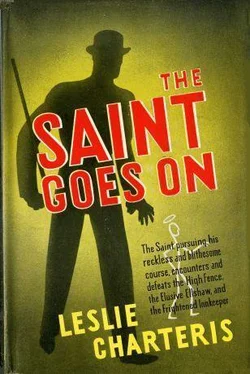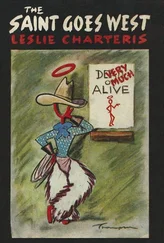Leslie Charteris
The Saint goes on
To
Prosper Buranelli
… a small souvenir of many gallons of pre-Repeal wine, and many
nights of superbly useless argument which I shall always love to
remember.
Apart from the fact that neither of them was a productive or useful member of the community, Johnny Anworth and Sunny Jim Fasson had very little in common. They did not own allegiance to the same Dear Old School; they had no meeting-ground in a passion for the poems of William Wordsworth, no shared devotion to collecting birds' eggs or the rarer kinds of cheese. But the circumstances in which they ceased to adorn their usual places in the files of Records Office at New Scotland Yard had a connecting link which must be the chronicler's excuse for reciting them in quick succession.
Johnny Anworth entered a jeweler's shop in Bond Street during the Easter holidays of that year, and omitted to pay for what he took out. He entered through the ceiling, from an apartment on the floor above which he had rented temporarily. It was a pretty neat job, for Johnny was a sound worker in his line; but it had his personality written all over it, and Headquarters put out the routine dragnet and in twenty-four hours duly brought him in.
He was taken to Market Street police station, where he was seen by the Divisional Inspector. The awkward part of it from Johnny's point of view was that he had most of the proceeds of his burglary on him when he was caught — at any rate he had all the precious stones, which had been prised out of their settings, carefully packed in a small cardboard box, and done up with brown paper and string. What he had not had time to do was to write an address on the package, and for this reason the D. I. was very gentle with him.
"You were going to send that stuff to the High Fence, weren't you, Johnny?" he said.
"I dunno wot yer talkin' abaht, guv'nor," answered Johnny mechanically. "I fahnd the stuff lyin' in the gutter in Leicester Square, an' I did it up to send it to the Lost Property Office."
The Divisional Inspector continued to be gentle.
"You've been in stir six times already," he said, consulting a memorandum on his desk. "If we wanted to be hard on you now, we could have you sent to the Awful Place. You could go to the Moor for seven years, and then have three years' preventive detention waiting for you. On the other hand, if you told us who you were going to send this parcel to, we might forget about those previous convictions and put in a word for you."
Johnny considered this. There is honour among thieves, but it is not designed to resist bad weather.
"Orl right, guv'nor," he said philosophically. "I'll squeal."
This story might have ended there if the station short-hand writer had been available. But he had already gone out to lunch; and the Divisional Inspector was also hungry.
They put Johnny Anworth back in his cell with instructions to order anything he wanted to eat at the D. I.'s expense, and an appointment to make his statement at two o'clock. His lunch, which consisted of roast beef and cabbage, was delivered from a nearby restaurant by an errand-girl who deposited it in the chargeroom. Almost as soon as she had gone, after some flirtatious exchanges with the charge-sergeant, it was picked up by the gaoler, who carried it in to Johnny. He was the last man who saw the talented Mr. Anworth alive.
The girl had taken the tray from the chef in the kitchen, and no one had stopped her or spoken to her on the way. The chef had had no unusual visitors. The only people in the charge-room when the girl delivered the tray were the gaoler, the charge-sergeant, and Inspector Pryke. And yet, somehow, somewhere on the short journey which Johnny Anworth's last meal had taken, someone had contrived to dope the horseradish sauce with which his plate of roast beef was garnished with enough cyanide to kill a regiment.
The murder was a nine days' wonder which provoked its inevitable quota of headlines, newspaper criticisms, and questions in Parliament. Every inquiry seemed to lead to a dead end. But the Criminal Investigation Department has become phlegmatically accustomed to dead ends; and Chief Inspector Teal was still working methodically on the case, six weeks later, when Mr. James Fasson clicked to the tune of five thousand pounds' worth of gems to which he had no legal right whatsoever.
The assets of Sunny Jim Fasson were a smile which made children and hard-boiled business men trust him instinctively, a wardrobe of prosperous-looking clothes, some high-class American luggage plastered with a wonderful collection of expensive cosmopolitan labels, enough ready cash to create an impression of affluence at any hotel where he stayed, and a girl friend who posed as his wife, sister, niece, or old widowed mother with equal success and distinction.
On this occasion he stayed at the Magnificent, a hotel which he had not previously honoured with his presence. He was a wealthy American on his honeymoon; and for a few days he and his charming wife were quite happy seeing the sights and making a round of the theatres. One day, however, a small rift appeared in their marital bliss.
"I guess she's feelin' kinda homesick, or something," Sunny Jim confided to a clerk at the inquiry desk. "Whaddaya do when your wife gets moody, son?"
"I don't really know, sir," confessed the clerk, who was not employed to answer that kind of inquiry.
"Y'know, I always think a woman wants some kinda kick outa life when she feels that way," mused Sunny Jim. "Some lil thing that makes her feel good with herself. A noo hat, or a fur coat, or — or a diamond bracelet… That's what she wants!" he cried, recognising divine inspiration when it breathed on him. "A diamond bracelet! Say, what's the best store in this town to buy a diamond bracelet?"
"Peabody's, in Regent Street, are very good, sir," said the clerk, after a moment's thought.
Sunny Jim beamed.
"Ring 'em up and tell 'em to send some of their best diamond bracelets around," he said. "I'll have the man take 'em right up to her room, and she can pick what she likes. Say, I bet that'll put everything right."
Whether it put everything right or not is a question that the various parties concerned might have answered differently. The hotel was glad enough to oblige such a lavish guest; and Mr. Peabody, the jeweler, was so impressed with their brief account of Mr. James Fasson that he hurried round in person with six diamond bracelets in his bag. After a short discussion, Mrs. Fasson chose the most expensive, a mere trifle valued at a thousand pounds; and Mr. Fasson rang for a page-boy to take his cheque for that amount round to the bank to be cashed.
"You must have a drink while you're waitin' for your money," said Sunny Jim, turning to a bottle and a siphon which stood on a side table.
Mr. Peabody had a very small drink; and remembered nothing more for another hour, at the end of which time Mr. and Mrs. Fasson had left the Magnificent for ever, taking all his six diamond bracelets with them. Nor did Mr. Peabody's afternoon look any brighter when the bank on which Mr. Fasson's cheque had been drawn rang up the hotel to mention that they had never carried an account for anybody of that name.
This episode was the subject of a hurriedly assembled conference in the Assistant Commissioner's room at New Scotland Yard.
The other two men present were Chief Inspector Claud Eustace Teal and Junior Inspector Pryke. Mr. Teal, who was responsible for the conference, explained his point of view very briefly.
"Anworth and Fasson used to be fairly well acquainted, and if Anworth was using the High Fence there's a good chance that Fasson will be using him too. I know exactly where I can lay my hands on Sunny Jim, and I want permission to try and get a squeal out of him unofficially."
Читать дальше












